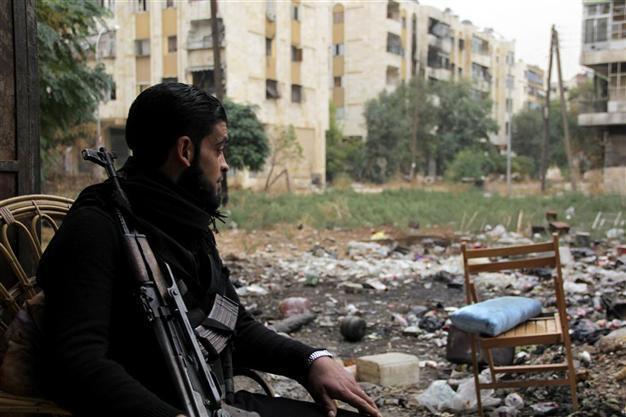New rebel alliance wants Syria as 'Islamic state'
BEIRUT - Agence France-Presse

A rebel fighter is pictured on November 7, 2013, in the northern city of Aleppo. The Syrian conflict has killed more than 120,000 people since it broke out in March 2011, according to the Syrian Observatory for Human Rights. AFP PHOTO
A newly formed rebel alliance said Nov. 26 it wants to replace Syria's regime with an "Islamic state," but insisted it would protect minorities and not create an "oppressive, authoritarian system."
The covenant of the Islamic Front, Syria's largest armed opposition grouping with tens of thousands of fighters battling to oust President Bashar al-Assad, spells out its intention to play a role in politics and society as well as on the battlefield.
But the authors of the document did not provide a clear vision of a post-Assad Syria, perhaps fearing that delving into details would splinter the alliance of seven key Islamist groups announced on Friday, which hopes to unify the fractured opposition.
Syria's uprising began as a series of peaceful pro-democracy protests in March 2011, but a brutal regime crackdown ignited a full-blown civil war in which hardline Islamist groups have taken on an increasingly prominent role.
Under the subheading "democracies and parliaments," the Islamic Front says representative government "is based on the notion that the people have the right through institutions to (determine) legislation, whereas in Islam God is the sovereign." But it adds: "This does not mean that we want an oppressive, authoritarian system," saying Syria should be ruled through a Shura, or Islamic consultative council.
While hardline jihadists such as Al-Qaeda reject democracy outright, moderate Islamists have long argued that democracy and religion are compatible so long as Islamic law is respected.
Extremist groups across the Muslim world have tried to impose an extreme form of Islamic law, including the maiming and killing of those convicted by self-styled Islamic courts, but such interpretations have been rejected by mainstream Muslim authorities.
The Islamic Front rejects secularism, which it defines as "dividing religion from life and society, and reducing it exclusively to rituals, customs and traditions.
"This is contradictory with Islam." But on the question of minorities, the document says Syria is "home to a varied patchwork of ethnic and religious minorities," adding that such communities were protected "for hundreds of years" under sharia law.
However, the covenant describes foreign jihadists who have travelled to Syria to fight alongside the rebels -- and who often espouse the most radical forms of Islam -- as "brothers who came to help us," saying "we must protect them".
The Islamic Front, which includes a Kurdish Islamic faction, also says it rejects "any project to partition" Syria.
The document adds that "the only way to bring about its objectives, in light of Assad's force and oppressiveness and the world's betrayal of the Syrian people's just cause is through... military rebellion."
